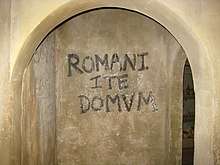Romani ite domum
"Romani ite domum" (Romans go home) is the corrected Latin phrase for the graffito "Romanes eunt domus" from a scene in the film Monty Python's Life of Brian.

Life of Brian
The scene features John Cleese as a centurion and Graham Chapman as Brian, at that stage a would-be member of the revolutionary group the "People's Front of Judea". To prove himself worthy to be a member of the group, Brian has to daub the anti-Roman slogan "Romans go home" on the walls of Governor Pontius Pilate's palace in Jerusalem, under cover of darkness, written in Latin so the Romans can understand it.
He completes the phrase Romanes eunt domus when he is caught by a centurion. Brian is terrified and clearly expects to be killed on the spot. However, upon reading Brian's message and realising that its spelling and grammar are atrocious, the centurion instead angrily corrects Brian's mistakes, as what he has written translates to "People called 'Romanes' they go the house."[1] He forces Brian to use the proper imperative and accusative cases and write the correct phrase, Romani ite domum, 100 times, threatening to "cut [his] balls off" if he has not done so by sunrise next morning. Brian does so, covering nearly every surface of the plaza with the graffiti.
When he does complete the task in the following morning, the soldier guarding him tells him "don't do it again" and leaves with his partner. Just as they leave, three other soldiers come round the corner and see the graffiti. Brian realises his position and races off chased by the soldiers.
In subsequent scenes, various Roman soldiers can be seen erasing the graffiti to censor the seditious message.
Case of domus
The exchange on the case of domus concludes:
Centurion: " 'Domus'? Nominative? 'Go home', this is motion towards, isn't it, boy?"
Brian: "The dative, sir?"
[Centurion draws his sword and holds it to Brian's throat
]
Brian: "Ahh! No, not the dative, not the dative, sir. No, the, accusative, accusative, 'ad domum', sir!"
Centurion: "Except that 'domus' takes the ...?"
Brian: "The locative, sir!"
Centurion: "Thus it is ...?!"
Brian: "'Domum'."
Students of Latin often note that domi is the locative of domus in literary classical Latin. The (allative) case construction used in the final formulation is accusative of motion towards.[2]
References
- "Life of Brian Script - Scene 9: Brian Learns to Conjugate". montypython.50webs.com. Retrieved 26 October 2018.
- The Latin Dictionary: domus